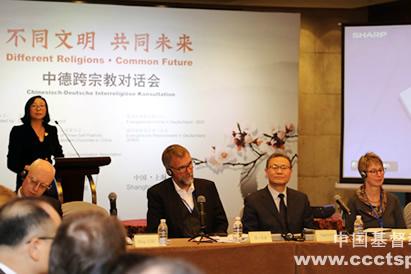On May 10, 2018, the second Chinesisch-Deutsche Interreligiöse Konsultation (Chinese-German Interreligious Consultation) kicked off in Shanghai with the theme "Different Religions, Common Future".
About 50 German and Chinese representatives from different religious, political, and academic circles attended it.
The meeting was co-sponsored by the CCC&TSPM, China Religious Culture Communication Association, Evangelische Kirche in Deutschland(EKD), and Evangelisches Missionswerk in Deutschland(EMW).
The one-and-half-a-day dialogues were made around two topics, "the sinicization/inculturation of religions" and "the exchanges among different religions".
Xiao Hong, deputy secretary-general of China Religious Culture Communication Association, said that first consultation held in Hamburg in May 2016 was a result of the willingness to strengthen religious talks between the two countries.
In the opening ceremony, Rev. Gao Feng, president of the CCC, said that the consultation was a good platform to improve the exchanges and cooperation between different religions of the sides. Although the Chinese church promoted the sinicization of Christianity, it didn't deny its ecumenism.
Rev. Jan Janssen, leader of the German delegation, pointed out that the participation of different religious people reflected the diversity. He expected the two sides to open the door for the dialogues with mutual respect and to make contributions to the future development of religions.
In the sub-topic of "the sinicization/inculturation of religions", nine Chinese and German representatives from different religions gave key-note lectures.
Rev. Wen Gu from Nanjing Union Theological Seminary delivered a speech titled "Sinicizing the Chinese Church: Probe into the Contributions of Bishop K.H.Ting to the Sinicization of Christianity".
Yang Faming, head of the Islamic Association of China and president of the China Islamic Institute, spoke of "Historical Path and Modern Practice of the Sinicization of Islam in China".
Dr. Zeberiya Altug, chairman of the Hamburg branch of DITIB, stated around the development history of Muslims in the Europe. Muslims in Germany who were previous migrant workers became citizens. Then they won the state's recognition of Islam, among which the Protestant and Catholic churches played an essential part.
Priest Tan Lizhou, associate secretary of the Chinese Patriotic Catholic Association, said that the essence of the sinicization of Catholicism was to build Chinese Catholicism as an integrated and unique church.
Master Zhao Cheng, vice-president of the Shanghai Buddhist Association, addressed that an academic structure and a theoretical exploration of the sinicization of religions should be made from the angel of religious studies.
Professor Xu Yihua, director of Department of International Politics at Fudan University, made a speech titled "Academics in A Great Power - The Sinicization of Christianity as Academic Study". He added that the religious studies in China might face an ill-fated future, compared to other objects like arts and humanities and social science. The research circle of Chinese Christianity should make the most of excellent Chinese traditional culture and Chinese and foreign Christian research resources to lay the ground work for a Chinese style Christian research academic system.
Dr. Silke Lechner, deputy head of the working group "Peace Responsibility of Religions" at the German Federal Foreign Office, described the diversity of religions in Germany from the perspective of the relationship between religion and state.
- Translated by Karen Luo













